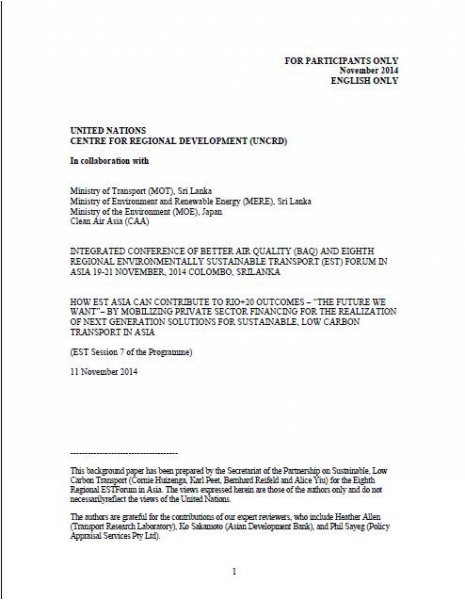The Partnership on Sustainable, Low Carbon Transport (SLoCaT) has published a series of reports in 2014 in the areas of sustainable development, climate change and financing of sustainable transport.
SUSTAINABLE DEVELOPMENT
SLoCaT Results Framework on Sustainable, Low Carbon Transport– Executive Summary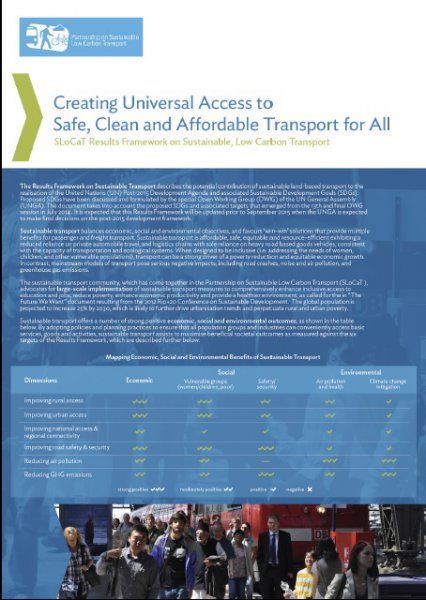
By Partnership on Sustainable, Low Carbon Transport
SLoCaT Results Framework on Sustainable, Low Carbon Transport defines the 2030 vision of the Sustainable Transport community on what should be achieved in terms of improving rural, urban as well as national and regional access to goods, markets, jobs and services while minimizing the negative impacts on road safety, air quality and climate change. The Framework consists of 6 targets (3 on access and 3 on negative externalities) supported by a series of indicators.
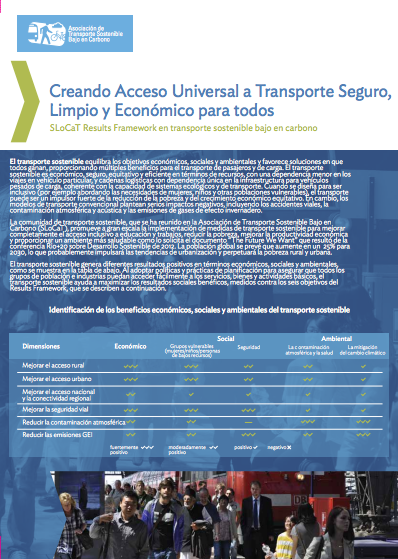 SLoCaT Results Framework en transporte sostenible bajo en carbono – Executive Summary (Spanish)
SLoCaT Results Framework en transporte sostenible bajo en carbono – Executive Summary (Spanish)
By Partnership on Sustainable, Low Carbon Transport
La comunidad de transporte sostenible, que se ha reunido en la Asociación de Transporte Sostenible Bajo en Carbono (SLoCaT), promueve a gran escala la implementación de medidas de transporte sostenible para mejorar completamente el acceso inclusivo a educación y trabajos, reducir la pobreza, mejorar la productividad económica y proporcionar un ambiente más saludable como lo solicita el documento “The Future We Want” que resultó de la conferencia Rio+20 sobre Desarrollo Sostenible de 2012.
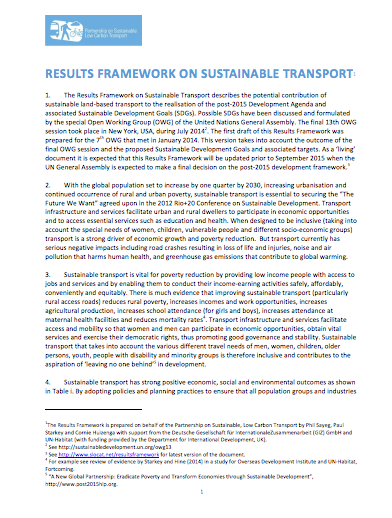 Final Draft of Results Framework on Sustainable, Low Carbon Transport
Final Draft of Results Framework on Sustainable, Low Carbon Transport
By Partnership on Sustainable, Low Carbon Transport
The Results Framework on Sustainable Transport describes the potential contribution of sustainable land-based transport to the realisation of the post-2015 Development Agenda and associated Sustainable Development Goals (SDGs). Possible SDGs have been discussed and formulated by the special Open Working Group (OWG) of the United Nations General Assembly. The final 13th OWG session took place in New York, USA, during July 20142. The first draft of this Results Framework was prepared for the 7th OWG that met in January 2014. This version takes into account the outcome of the final OWG session and the proposed Sustainable Development Goals and associated targets. As a ‘living’ document it is expected that this Results Framework will be updated prior to September 2015 when the UN General Assembly is expected to make a final decision on the post-2015 development framework.
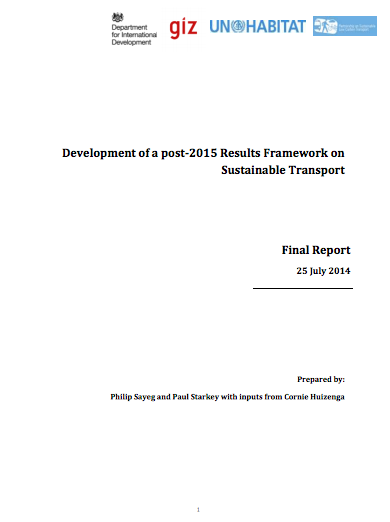 Development of a Post-2015 Results Framework on Sustainable Transport
Development of a Post-2015 Results Framework on Sustainable Transport
By Philip Sayeg and Paul Starky with inputs from Cornie Huizenga
The Report on the SLoCaT Results Framework on Sustainable Transport documents the progress towards a results frame work relating to sustainable transport, which is integrated in to the United Nations Sustainable agenda. It lists a range of activities performed by various bodies, key achievements that have been attained along with future goals.
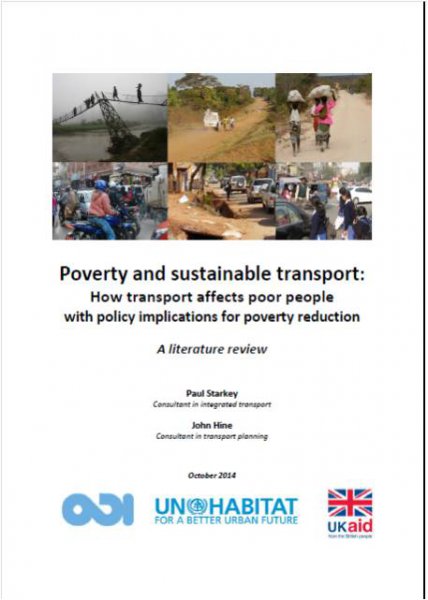
By Paul Starky (consultant at integrated transport) and John Hine (consultant at transport Planning ,October 2014
The Literature Review focuses on how access to urban and rural transportation can benefit the lives of the poor, through reducing the level of isolation they normally face. It anaylzes of the poverty implications of urban and rural transport was requested by thePartnership on Sustainable, Low Carbon Transport (SLoCaT), contracted by UN‐Habitat and implemented by the Overseas Development Institute (ODI) with funding from UK Department of International Development (DFID). The research questions concerned the extent to which the poor can participate in the transport sector, benefit from transport, and be adversely affected by transport externalities.
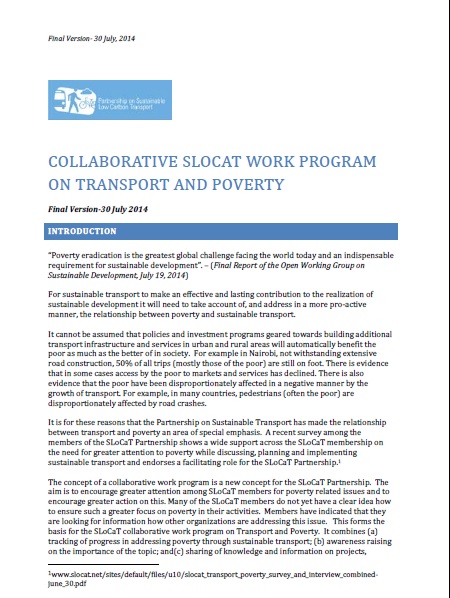 Collaborative SLoCaT Work Program on Transport and Poverty
Collaborative SLoCaT Work Program on Transport and Poverty
By Partnership on Sustainable,Low Carbon Transport (SLoCaT)
The aim of the SLoCaT Partnership Collaborative Work Program on Transport and Poverty is to encourage greater attention and action among SLoCaT members for poverty related issues. It addresses the connectionbetween use of sustainable transport and how it can have a positive impact on the lives of those in poverty, and it also summarizes a range of activates and programs being performed with the goal of promoting this agenda. The collaborative work program combines (a) tracking of progress in addressing poverty through sustainable transport; (b) awareness raising on the importance of the topic; and (c) sharing of knowledge and information on projects, assessment tools, capacity building programs, targeting mechanisms.
CLIMATE CHANGE
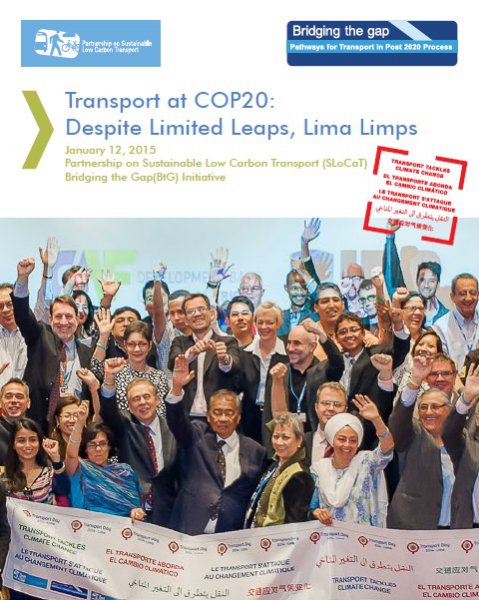 Transport at COP20: Despite Limited Leaps, Lima Limps
Transport at COP20: Despite Limited Leaps, Lima Limps
By Partnership on Sustainable, Low Carbon Transport and Bridging the Gap Initiative
This report assesses the 20th Conference of the Parties (COP20) of the United Nations Framework Convention on Climate Change (UNFCCC) in Lima, Peru in December 2014, as viewed through the lens of sustainable transport. The report is the final output of the the Partnership on Sustainable Low Carbon Transport (SLoCaT Partnership) and the Bridging the Gap (BtG) Initiative.tracking team, which for the first time monitored five negotiating streams with particular relevance to transport, which included pre-2020 ambition, INDCs, nationally-appropriate mitigation actions (NAMAs), technology transfer, and climate finance (a sixth area, adaptation, is also included among the areas of analysis in this document) at COP 20.
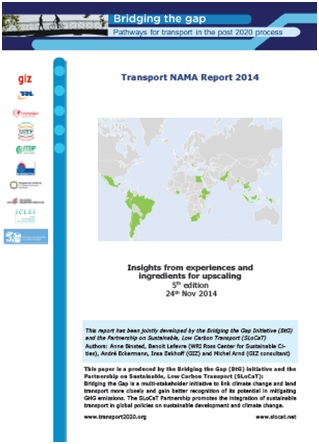 Transport NAMA Report 2014: Insights from experiences and Ingredients for Upscaling
Transport NAMA Report 2014: Insights from experiences and Ingredients for Upscaling
By Bridging the Gap Initiative and the Partnership on Sustainable, Low Carbon Transport
Transport NAMA Report 2014 report briefly explores the challenges with developing and implementing Transport NAMAs. Subsequently, the report provides recommendations for key stakeholder groups on how actors can contribute to increasing the scale of engagement with transport NAMAs, the impact of these NAMAs, and the time taken to progress from NAMA identification to implementation.
Land Transport’s Contribution to a 2°C target
By Bridging the Gap Initiative and the Partnership on Sustainable, Low Carbon Transport
The Bridging the Gap Initiative (BtG) and the SLoCaT Partnership have launched, a joint paper titled “Land Transport’s Contribution to a 2°C target”. The paper provides key messages for climate change negotiators and policy makers on the potential contribution of the land transport sector to global climate change mitigation strategies. The report summarises key facts on the mitigation potential in the land transport sector for both passenger and freight, institutional and global governance perspectives and financing requirements.
Please also see:
- Key messages from “Land Transport’s Contribution to a 2°C target” Report
- Short Summary of the “Land Transport’s Contribution to a 2°C target” Report
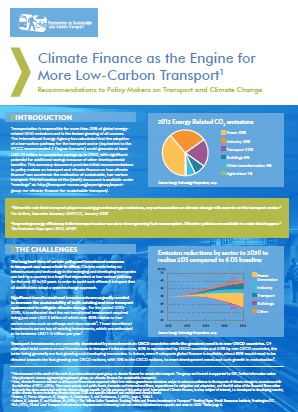
Climate Finance as the Engine for More Low-Carbon Transport
By Cornie Huizenga, Philip Sayeg, Laura Wuertenburger
Transportation is responsible for more than 20% of global energy related GHG emissions and is the fastest growing of all sources. The International Energy Agency has calculated that the adoption of a low-carbon pathway for the transport sector (equivalent to the IPCCC recommended 2 Degree Scenario) could generate at least USD 70 trillion in cumulative savings up to 2050, with significant potential for additional savings because of other developmental benefits. This Executive Summary document provides initial recommendations to policy makers on transport and climate finance on how climate finance2 can accelerate the realization of sustainable, low-carbon transport. For the downloadable version of the Executive Summary, please click here.
The Policy Brief is a draft for discussion. It is an intermediate result of the work of an international expert group on climate finance for sustainable transport facilitated through the Partnership on Sustainable, Low Carbon Transport (SLoCaT). The group and its work is supported by GIZ in the frame of the TRANSfer project. The objective of the group is to help ensure that climate finance is increasingly used for sustainable transport in an effective way to realize the large GHG emission reduction potential in the sector. The TRANSfer project is run by GIZ and funded by the International Climate Initiative of the German Ministry for the Environment, Nature Conservation, Building and Nuclear Safety (BMUB).
For full-text of the Draft Policy Brief, please click here.
By Partnership on Sustainable, Low Carbon Transport(SLoCaT) in Collaboration with Ministry of Transport (Sri Lanka), Ministry of Environment and Renewable Energy (Sri Lanka), Ministry of the environment (Japan) and Clean Air Asia
This paper assesses the potential contribution of the private sector to scale up sustainable low carbon transport through three primary strategies: public-private partnerships, bond financing, and private sector operations of multilateral development banks. It focuses primarily on debt rather than equity financing (while acknowledging that much informal transport in Asia is equity financed), and on transport infrastructure rather than operations & maintenance (while acknowledging that the latter hold significant potential for private sector involvement).
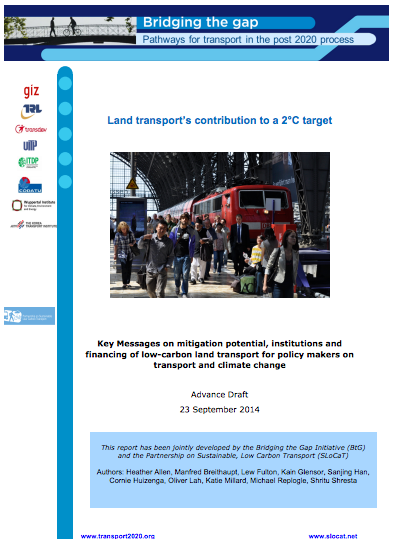
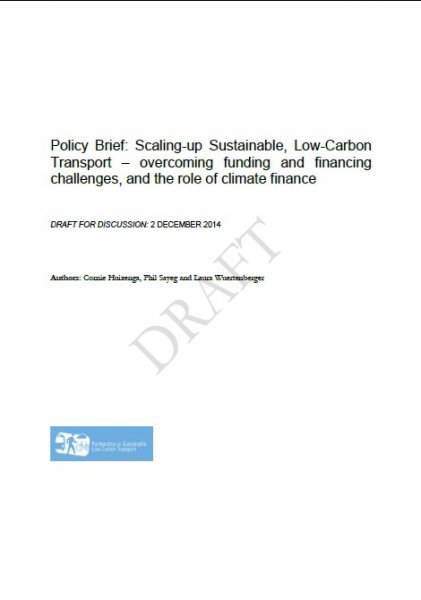 Policy Brief: Scaling-up Sustainable, Low-Carbon Transport – overcoming funding and financing challenges, and the role of climate finance
Policy Brief: Scaling-up Sustainable, Low-Carbon Transport – overcoming funding and financing challenges, and the role of climate finance